Dice are considered a hallmark of adventure or skirmish games (your ZOMBICIDEs or ARKHAM HORRORs), and they can be used to great effect in Euros. Sadly STONE AGE—one of the most popular in this lane—falls flat for me every time.
Fitting with its prehistoric theme, STONE AGE is almost primordial in a gameplay loop typical of hundreds of Eurogames. You put out workers, get resources, then spend those on various buildings and civilization cards—rinse and repeat. The gimmick rests in the push-your-luck aspect of resource gathering. In other games, you simply acquire goods from placing workers on a spot. In STONE AGE, you have to roll dice and beat certain thresholds i.e. you get wood equal to the roll divided by three; placing more workers at a spot allows you to roll more dice.
My qualms with STONE AGE do not rest with the potential to bust and not generate anything—if anything, that’s an aspect that appeals to me. The game gives you plenty of literal tools to manipulate the odds through adding to rolls or placing more workers to guarantee a good payout. Players have the choice to spread themselves thin to get a potential variety or resources with the risk of bursting or commit many meeples to one spot to get a safer guaranteed haul. Furthermore, players have the ability to gain more workers with the drawback of having to pay upkeep on them. Luck itself is not a turn off by any means, that is as long as the game has some level of mitigation and way to hedge your bets, and STONE AGE certainly has that.
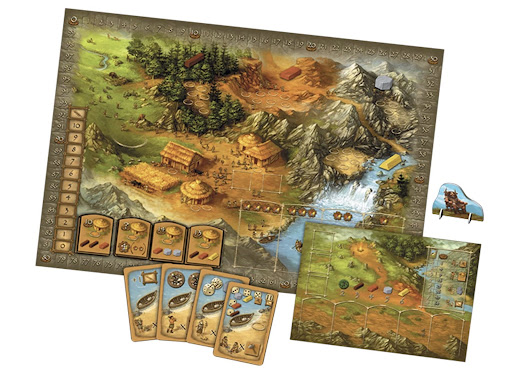
The problem is that all of these tools and manipulations are in service of boring resource generation with little else to distinguish it. In SPACE BASE, for example, players are able to upgrade their player boards to make themselves cooler over the course of a game. Furthermore, players are given options about what to do with the dice; a roll of a five and seven could trigger those two ships or add together to trigger the 12 slot. It’s a joy to heavily invest in one specific number and cross your fingers in the hopes of scoring a bunch of points off of one lucky roll. In STONE AGE, the only way to make yourself cooler is by getting more workers and upgrading your tools to allow for more manipulation of the dice. That counts for something, but most of the actions devolve into turning resources in for points, the stalest part of Eurogames, and something STONE AGE never overcomes.
STONE AGE’s specific flavor of randomness also factors into it falling flat. There’s two main types of randomness; output and input. The line between the two is blurry and many games feature a mix of the two types. Input is the randomness that goes into set-up or options: the cards you draw in your starting hand in MAGIC THE GATHERING, for example. Output randomness determines the outcome of an action. DUNGEONS AND DRAGONS’ combat system is a classic example of output randomness where accuracy and damage are determined by a die roll. Most Euro games that use dice, such as CASTLES OF BURGUNDY, KINGSBURG, COIMBRA, and GRAND AUSTRIA HOTEL, use them as input randomness, determining the type of actions you have available to you, or in the case of the latter two, affecting the power of the action and triggering parts of your engine. STONE AGE, on the other hand, uses dice as output randomness; you choose to take an action, then you roll dice to determine your success there.
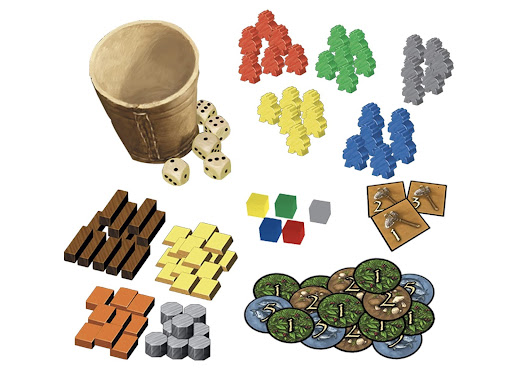
Output randomness can be frustrating, because some games go overboard and leave too much to chance. However, it can also produce some of the most exciting moments in gaming. For example, a racing game like CAMEL UP climaxes in everyone around the table cheering for their chosen dice to come out of the pyramid, or an action-adventure like ELDER SIGN where a couple die rolls determine whether the world is saved or Cthulhu drives everyone mad. There’s no excitement to STONE AGE’s output randomness; getting two, one, or *gasp* zero stone is dull enough as it is, made worse by the fact that what you do with the resources is no more interesting.
It’s easy to see STONE AGE’s appeal because it’s a natural evolution of what ingratiates many to CATAN, the grandfather of modern board games. Both games involve rolling dice to generate resources. People unfamiliar with meeples are still comfortable with dice through YAHTZEE or other ‘classics,’ thus it’s easier to wrap their heads around the probabilities and strategies manipulating the odds. But CATAN has negotiations to spice up this loop, and many games since then have expanded and revolutionized the use of dice. STONE AGE’s traditional usage of dice makes it more welcoming than Euros with more complicated input randomness, but even lighter games like SPACE BASE use output randomness resource generation to help build a cool engine that makes future rolling dice more exciting. In comparison to all these advancements, STONE AGE can’t help but feel antiquated.


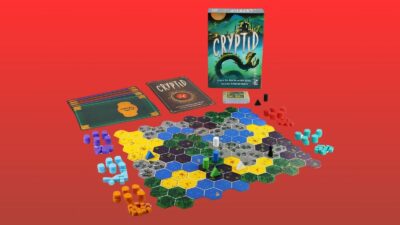


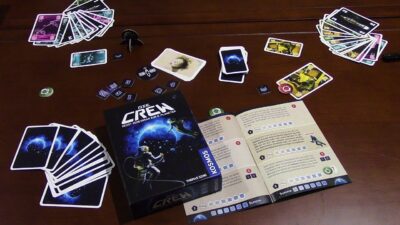


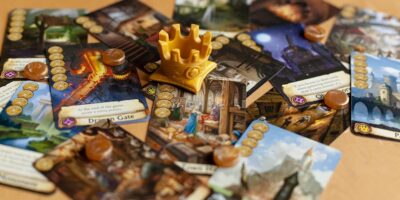







Comments